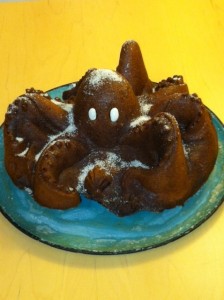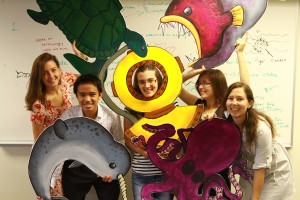After an exciting and educational four weeks, the MIT Sea Grant Ocean Science Internship program came to a close, and the interns wowed the Sea Grant Staff and their families, as well as a few other visitors, with a presentation on their research on the Boston Harbor Islands.
We spent the last few days frantically finishing our research projects and putting together a slide show that we hoped would be informative, as well as visually-pleasing. In preparation for our presentation, we read up on how to do an effective powerpoint presentation. Some experts cautioned against using bullet points, while others saw them as imperative. Some advised using the 6 x 6 rule, while others admonished such dogma as nonsense.
Should we inject humor into our presentation? The assessment of biodiversity and introduced species is serious business. Still, we couldn’t help interjecting our suggestion for mitigating the effect of the recently-introduced Asian Shore Crab: Looks delicious!
One blogger even listed eating cake as a requirement for a successful completion of a scientific talk. Luckily, we had that part down, as Isabelle brought in a topical dessert, which was not only beautiful, but delicious as well!
As the new internship coordinator for the summer, I had many goals for the program. Coming from a rigorous graduate program, I was excited that from the beginning of the program, these students had an in-depth understanding of biological concepts that allowed us to tackle really sophisticated ecological issues. I wanted to emphasize that although we think of science as being static and definition-driven, there are many issues that even biology’s greatest minds cannot come to a consensus on. How do we evaluate the health of an ecosystem? How do we define biodiversity? How to we manage invasive species? Not only were they were able to appreciate the complexity of these issues, they also brought original thought to discussions of these issues.
Even with extensive understanding of these concepts, any ecologist will tell you that this knowledge can’t always prepare you for conditions in the field. Being a field ecologist comes with a unique set of challenges, and I also hoped that my students would come away from this program understanding not only how to execute a field survey, but also understanding that things almost never go exactly as planned. Sometimes your equipment spazzes out when it gets too much salt on it. Sometimes the ferry taking you to your field site doesn’t come on time. Sometimes you come back to your lab and find that your data doesn’t even come close to fitting a normal distribution. In ecology, as in many fields, flexibility, quick thinking, and creative solutions come with the territory, and by getting out and doing actual scientific research, these students gained what I hope was a lesson in what it means to be a scientist.
So, to wrap everything up, I want to wish the interns best of luck and thank them for making it a delight to come to work every day!



Kate, Thank you so much for conducting such a great internship! The experience the interns received is so invaluable and to top it off they found an introduced species in the harbor! Such an exciting opportunity all around. Their presentation was so impressive, educational and entertaining. Thank you again.